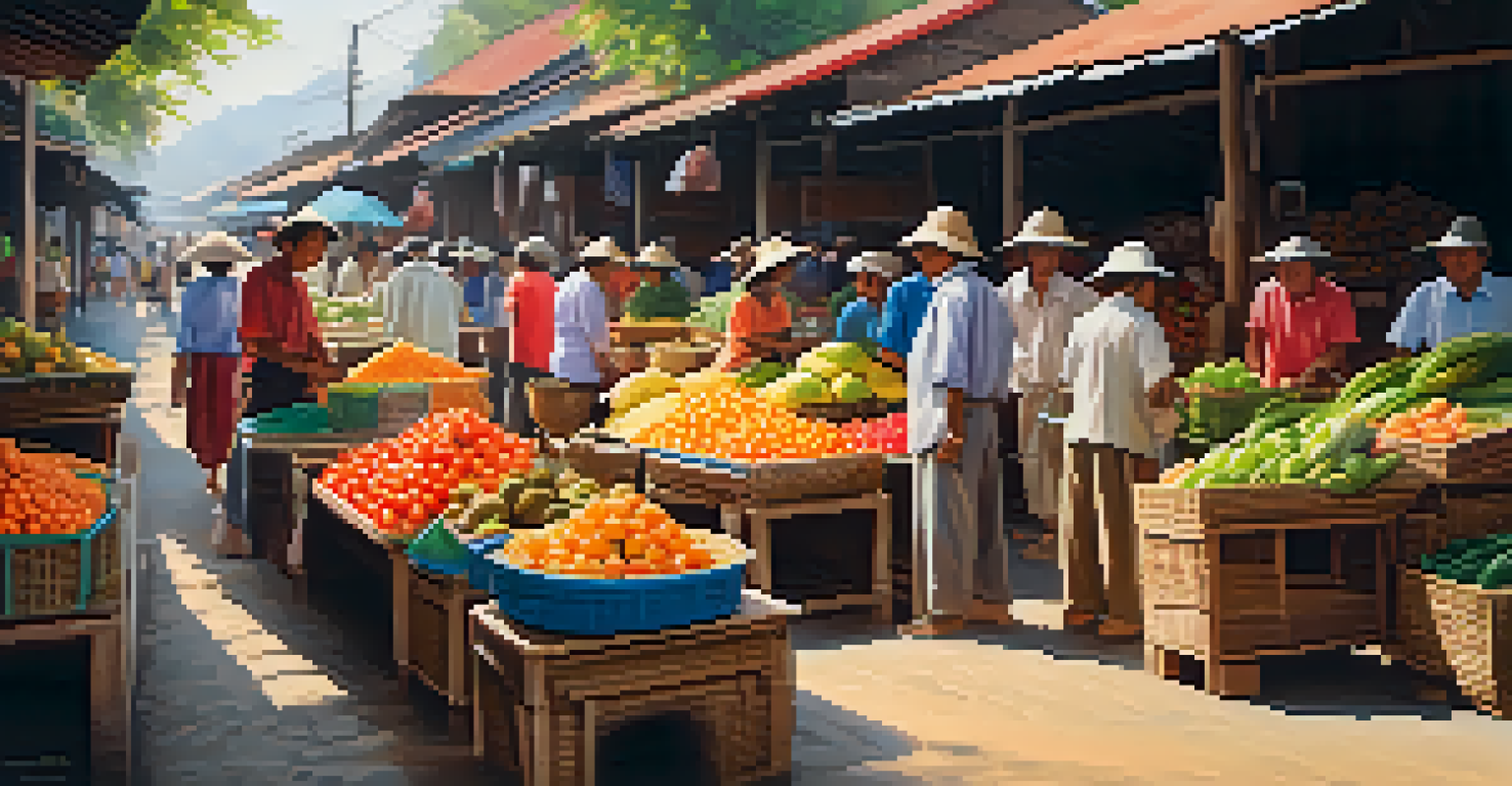The Benefits of Slow Travel in Thailand's Eco-Tourism Scene

Understanding Slow Travel and Its Importance
Slow travel is all about immersing yourself in a destination, allowing you to appreciate its culture, environment, and local communities. Unlike traditional travel, which often focuses on ticking off a checklist of sights, slow travel encourages a more thoughtful approach. This style of travel resonates deeply with the principles of eco-tourism, as it promotes sustainable practices and respect for nature.
Traveling – it leaves you speechless, then turns you into a storyteller.
In Thailand, where stunning landscapes and rich cultural heritage abound, slow travel offers a unique way to connect with the destination. Imagine spending a week in a quaint village, learning from the locals and participating in daily activities that reflect their way of life. This not only enriches your experience but also supports the local economy and helps preserve their traditions.
Ultimately, slow travel allows for a deeper exploration of Thailand's vibrant ecosystems and communities. It fosters a sense of mindfulness, encouraging travelers to appreciate the beauty around them while also understanding their impact on the environment. This approach aligns perfectly with eco-tourism, making it a vital aspect of responsible travel.
Connecting with Local Communities through Slow Travel
One of the most rewarding aspects of slow travel is the opportunity to engage with local communities. In Thailand, this can mean staying in a homestay, participating in community-led initiatives, or simply sharing a meal with a Thai family. These interactions often lead to unforgettable memories and a richer understanding of the culture.

When travelers take the time to connect with locals, they learn about traditional practices, from farming methods to cooking styles. For instance, participating in a rice farming workshop in northern Thailand not only teaches you about their agricultural techniques but also fosters a sense of community and shared experience. It’s a beautiful exchange where both sides benefit.
Embrace Local Cultures in Thailand
Slow travel fosters meaningful connections with local communities, enhancing cultural understanding and supporting traditional practices.
Moreover, supporting local communities through slow travel encourages sustainable practices. By choosing local guides, markets, and accommodations, travelers contribute financially to the preservation of cultural heritage and natural resources. This creates a win-win situation for both the traveler and the host community.
Embracing Nature and Eco-Conscious Practices
Slow travel inherently promotes a greater appreciation for nature, and Thailand is a paradise for those who love the outdoors. From lush jungles to pristine beaches, the country's diverse ecosystems offer countless opportunities for exploration. By taking your time to wander through these natural landscapes, you can truly absorb their beauty and complexity.
The journey not the arrival matters.
Eco-conscious practices are at the heart of slow travel. This might involve choosing to hike instead of taking a car, opting for eco-friendly accommodations, or participating in conservation projects. For example, volunteering for a sea turtle conservation program on Koh Tao not only allows you to connect with nature but also contributes to the protection of endangered species.
As travelers become more aware of their environmental impact, they are more likely to make choices that benefit the planet. This shift towards eco-tourism in Thailand helps preserve its breathtaking natural beauty for future generations, ensuring that these experiences remain available for years to come.
The Economic Impact of Slow Travel in Thailand
Slow travel can significantly boost the local economy in Thailand by promoting smaller, family-run businesses. When travelers prioritize local accommodations, eateries, and shops, they directly contribute to the livelihoods of the community. This economic support helps sustain traditional practices and promotes the preservation of cultural heritage.
In contrast to mass tourism, which often funnels money into large corporations, slow travel encourages a more equitable distribution of resources. For instance, staying in a locally owned guesthouse rather than a big hotel can make a world of difference for the family running the establishment. It creates jobs, fosters entrepreneurship, and allows communities to thrive.
Eco-Conscious Travel Benefits Nature
Engaging in eco-friendly practices during slow travel helps protect Thailand's stunning ecosystems for future generations.
Moreover, as the demand for eco-friendly experiences grows, local entrepreneurs are motivated to develop sustainable practices. This creates a positive feedback loop, where the community benefits economically while also preserving their environment. Slow travel thus plays a crucial role in fostering a sustainable economic landscape in Thailand.
Health and Well-being Benefits of Slow Travel
Traveling slowly not only enriches your experience but also has significant health benefits. By taking the time to unwind and immerse yourself in the surroundings, you can reduce stress and enhance your overall well-being. Thailand's serene landscapes and warm hospitality create the perfect backdrop for relaxation and rejuvenation.
Engaging in activities like yoga retreats or meditation workshops allows travelers to connect with their inner selves while enjoying the tranquil beauty of nature. Imagine practicing yoga on the beach at sunrise or meditating in a lush jungle; these experiences can lead to profound personal growth and a renewed sense of purpose.
Furthermore, slow travel encourages physical activity, whether through hiking, cycling, or simply wandering the local markets. This balance of mental and physical engagement contributes to a healthier lifestyle, making slow travel not just a pleasurable experience but a holistic one that nurtures both body and mind.
Exploring Thailand’s Unique Eco-Tourism Offerings
Thailand is home to a plethora of eco-tourism experiences that cater to the slow traveler. From exploring the stunning national parks like Khao Sok to visiting community-based tourism projects, there’s no shortage of options. These experiences are designed to connect visitors with the natural world and local cultures in meaningful ways.
For instance, visiting the Elephant Nature Park in Chiang Mai allows travelers to learn about elephant conservation while interacting ethically with these majestic creatures. Such experiences emphasize respect for wildlife and promote sustainable practices, creating awareness around the importance of protecting the environment.
Support Local Economies Sustainably
Prioritizing local businesses through slow travel promotes equitable economic growth and preserves cultural heritage in Thailand.
Additionally, eco-friendly tours often include activities like cooking classes with local chefs, guided nature walks, or workshops on traditional crafts. This not only supports local artisans but also provides travelers with a deeper understanding of Thailand’s rich heritage. Each unique offering enhances the slow travel experience and contributes to a more sustainable future.
Crafting a Personalized Slow Travel Itinerary in Thailand
Creating a personalized slow travel itinerary in Thailand allows you to focus on what truly resonates with you. Rather than rushing from one destination to another, you can take the time to explore areas that spark your interest, whether that’s art, cuisine, or nature. This tailored approach leads to a more fulfilling travel experience.
Consider starting your journey in a vibrant city like Chiang Mai, where you can spend several days visiting local markets, temples, and engaging in workshops. From there, you can slowly make your way to nearby villages, immersing yourself in the culture and connecting with locals. This gradual exploration allows for a richer understanding of the region.

Remember, the key to a successful slow travel itinerary is flexibility. Allow for spontaneous adventures, whether that means joining a local festival or taking an unplanned detour to a scenic viewpoint. This openness to new experiences often leads to the most memorable moments during your travels in Thailand.